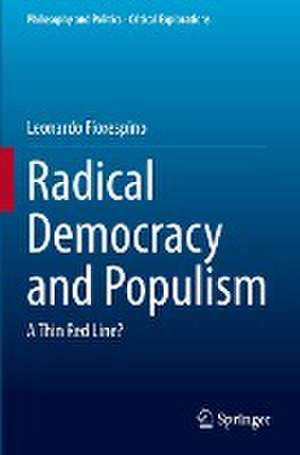Radical Democracy and Populism: A Thin Red Line?: Philosophy and Politics - Critical Explorations, cartea 18
Autor Leonardo Fiorespinoen Limba Engleză Paperback – 4 mar 2023
Whereas populism is often said to intertwine with democracy in some way, the contention of this book is that it significantly departs from democratic theory and practice, and belongs to a distinct conceptual space. It cannot be made to overlap, for instance, with “illiberal democracy”, the “democratic myth”, a crude electoral majoritarianism, nor can it amount to hiding undemocratic policies into properly democratic justifications. These positions, frequent as they are in the literature, are contested on the grounds of the dividing line identified, which starts unfolding at the level of the conception of ‘the people’ – i.e., of the sovereign – presupposed by populists and democrats.
This book is of great interest to scholars involved in the study of democratic theory, contemporary challenges to democracy and the recent upsurge of populist discourse, as it helps better understand populism as a political phenomenon and more adequately defines it as a self-standing concept in political theory.
| Toate formatele și edițiile | Preț | Express |
|---|---|---|
| Paperback (1) | 728.43 lei 43-57 zile | |
| Springer International Publishing – 4 mar 2023 | 728.43 lei 43-57 zile | |
| Hardback (1) | 734.44 lei 43-57 zile | |
| Springer International Publishing – 3 mar 2022 | 734.44 lei 43-57 zile |
Din seria Philosophy and Politics - Critical Explorations
-
 Preț: 226.46 lei
Preț: 226.46 lei - 20%
 Preț: 567.64 lei
Preț: 567.64 lei - 24%
 Preț: 633.28 lei
Preț: 633.28 lei -
 Preț: 394.29 lei
Preț: 394.29 lei - 15%
 Preț: 635.12 lei
Preț: 635.12 lei -
 Preț: 381.43 lei
Preț: 381.43 lei - 15%
 Preț: 580.17 lei
Preț: 580.17 lei -
 Preț: 384.31 lei
Preț: 384.31 lei - 18%
 Preț: 900.49 lei
Preț: 900.49 lei - 18%
 Preț: 725.92 lei
Preț: 725.92 lei - 15%
 Preț: 466.95 lei
Preț: 466.95 lei - 15%
 Preț: 634.68 lei
Preț: 634.68 lei - 15%
 Preț: 707.78 lei
Preț: 707.78 lei - 15%
 Preț: 690.76 lei
Preț: 690.76 lei - 18%
 Preț: 723.06 lei
Preț: 723.06 lei - 18%
 Preț: 721.51 lei
Preț: 721.51 lei - 18%
 Preț: 726.55 lei
Preț: 726.55 lei -
 Preț: 369.56 lei
Preț: 369.56 lei - 18%
 Preț: 895.76 lei
Preț: 895.76 lei - 15%
 Preț: 696.35 lei
Preț: 696.35 lei - 15%
 Preț: 701.90 lei
Preț: 701.90 lei - 15%
 Preț: 642.83 lei
Preț: 642.83 lei - 15%
 Preț: 648.24 lei
Preț: 648.24 lei - 20%
 Preț: 566.52 lei
Preț: 566.52 lei - 15%
 Preț: 585.73 lei
Preț: 585.73 lei - 15%
 Preț: 642.18 lei
Preț: 642.18 lei - 18%
 Preț: 731.73 lei
Preț: 731.73 lei -
 Preț: 390.25 lei
Preț: 390.25 lei
Preț: 728.43 lei
Preț vechi: 888.32 lei
-18% Nou
Puncte Express: 1093
Preț estimativ în valută:
139.43€ • 151.50$ • 117.20£
139.43€ • 151.50$ • 117.20£
Carte tipărită la comandă
Livrare economică 21 aprilie-05 mai
Preluare comenzi: 021 569.72.76
Specificații
ISBN-13: 9783030849719
ISBN-10: 3030849716
Pagini: 320
Ilustrații: X, 320 p. 1 illus.
Dimensiuni: 155 x 235 mm
Greutate: 0.47 kg
Ediția:1st ed. 2022
Editura: Springer International Publishing
Colecția Springer
Seria Philosophy and Politics - Critical Explorations
Locul publicării:Cham, Switzerland
ISBN-10: 3030849716
Pagini: 320
Ilustrații: X, 320 p. 1 illus.
Dimensiuni: 155 x 235 mm
Greutate: 0.47 kg
Ediția:1st ed. 2022
Editura: Springer International Publishing
Colecția Springer
Seria Philosophy and Politics - Critical Explorations
Locul publicării:Cham, Switzerland
Cuprins
PART I. DELIBERATIVE DEMOCRACY AND DEMOCRATIC PARTICIPATION.- Chapter 1. Jürgen Habermas and the communicative sovereignty of citizens.- Chapter 2. John Rawls and the constitutional identity of ‘the people'.- Chapter 3. The old kid in town: excursus on participatory democracy and a “participatory conception of deliberative democracy.- PART II. CONTEMPORARY REPUBLICANISM.- Chapter 4. Popular sovereignty as popular control: Philip Pettit’s republicanism.- Chapter 5. Richard Bellamy and the political constitution of the demos.- PART III. AGONISTIC DEMOCRACY.- Chapter 6. The people as hegemonic construction: Ernesto Laclau and Chantal Mouffe’s radical democracy.- Chapter 7. Dogmatization and pluralization: William Connolly’s sovereign people.- PART IV. POPULISM AND RADICAL DEMOCRATIC THEORIES: HOW THIN IS THE RED LINE?.- Chapter 8. Populism in contemporary political philosophy.- Chapter 9. Where the line lies, and how thin is it.
Notă biografică
Leonardo Fiorespino holds a PhD in political philosophy from Università degli Studi di Roma “Tor Vergata”, where he worked under the supervision of Professor Alessandro Ferrara. His academic interests include political philosophy and ethics, with special interest in democratic theory, liberalism, republicanism, normative theory, populism, constitutionalism.
Textul de pe ultima copertă
This book offers an extensive comparative analysis of populism and radical democratic theories, tracing the line dividing the respective conceptions of ‘people’ and ‘popular sovereignty’.
Whereas populism is often said to intertwine with democracy in some way, the contention of this book is that it significantly departs from democratic theory and practice, and belongs to a distinct conceptual space. It cannot be made to overlap, for instance, with “illiberal democracy”, the “democratic myth”, a crude electoral majoritarianism, nor can it amount to hiding undemocratic policies into properly democratic justifications. These positions, frequent as they are in the literature, are contested on the grounds of the dividing line identified, which starts unfolding at the level of the conception of ‘the people’ – i.e., of the sovereign – presupposed by populists and democrats.
This book is of great interest to scholars involved in the study of democratic theory, contemporary challenges to democracy and the recent upsurge of populist discourse, as it helps better understand populism as a political phenomenon and more adequately defines it as a self-standing concept in political theory.
Caracteristici
First book to systematically address the relationship of populism and radical democratic theory Provides an up-to-date definition of populism based on academic debate and empirical examples Brings together the extensive analysis of contemporary democratic theory and the flourishing literature on populism
